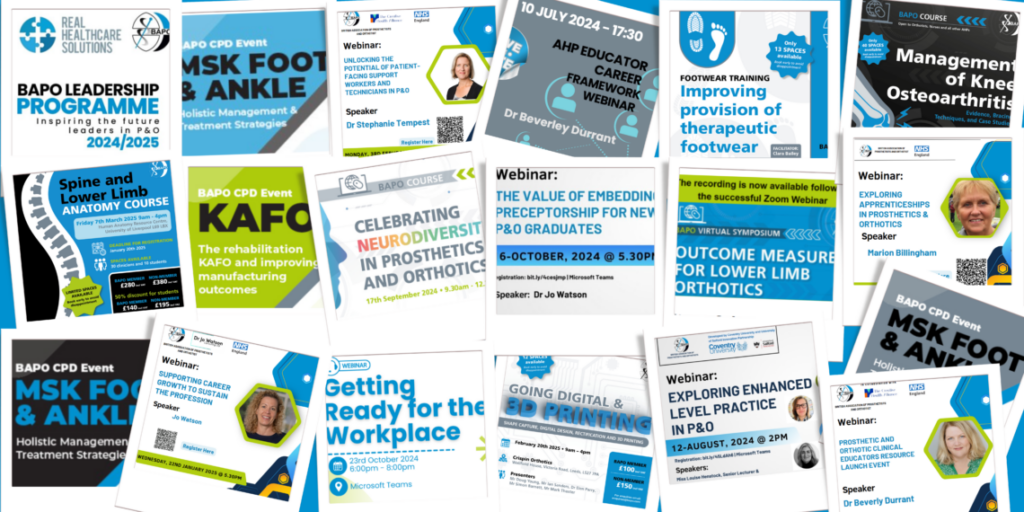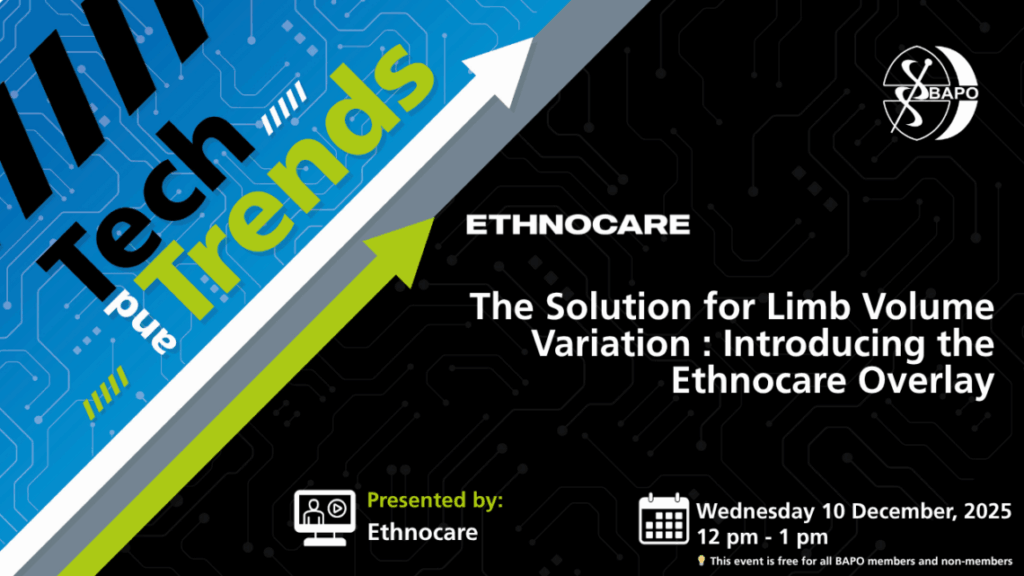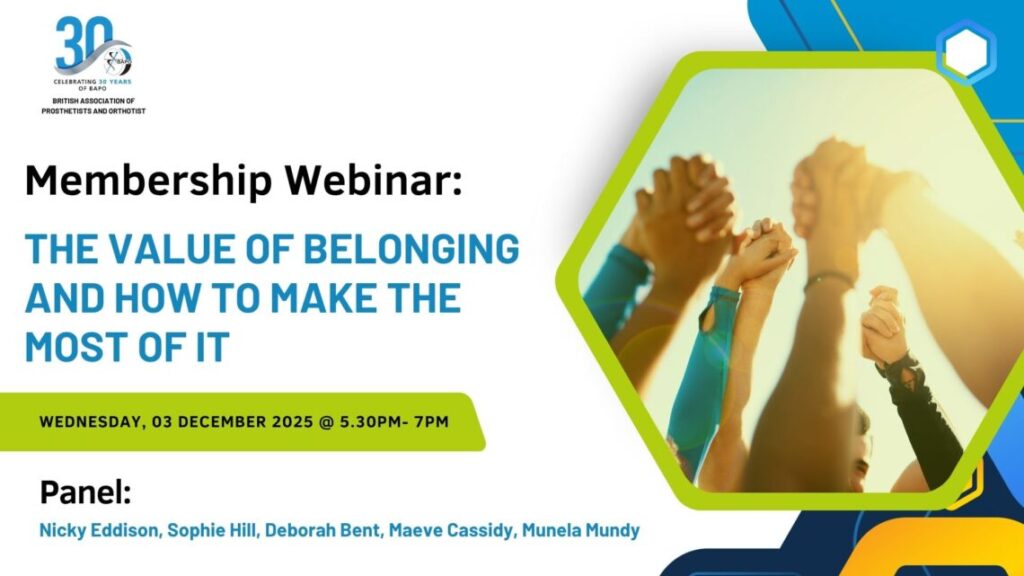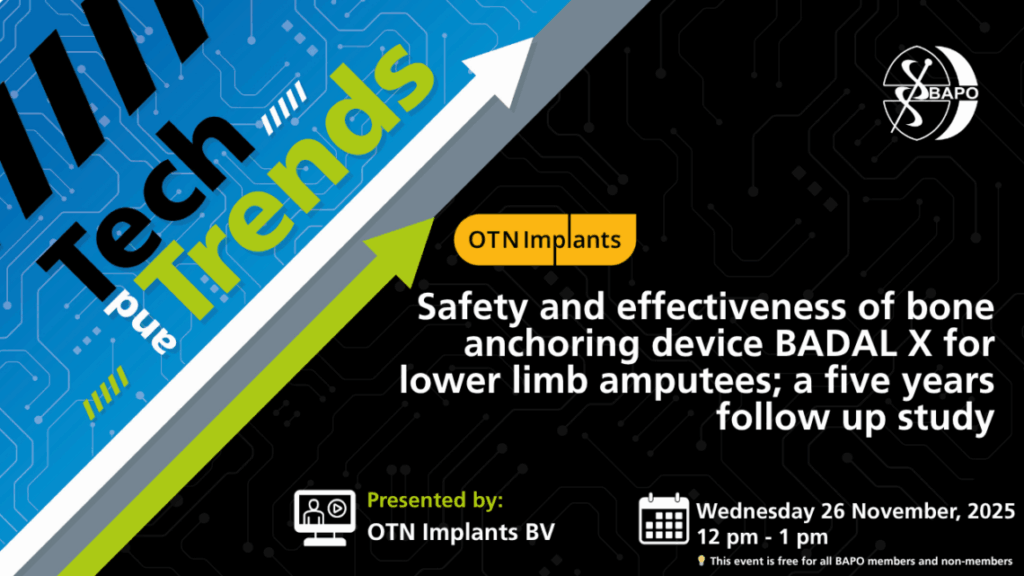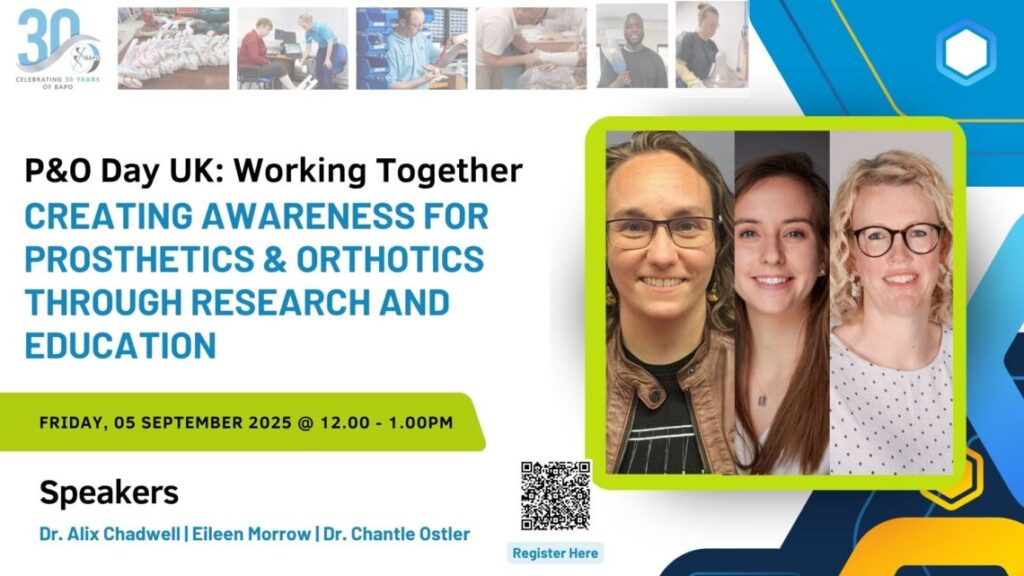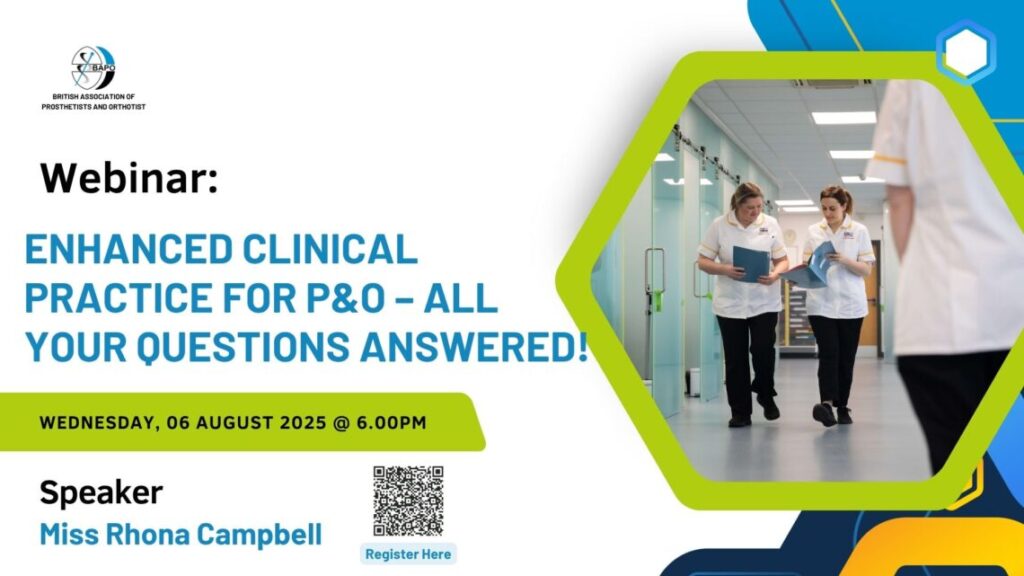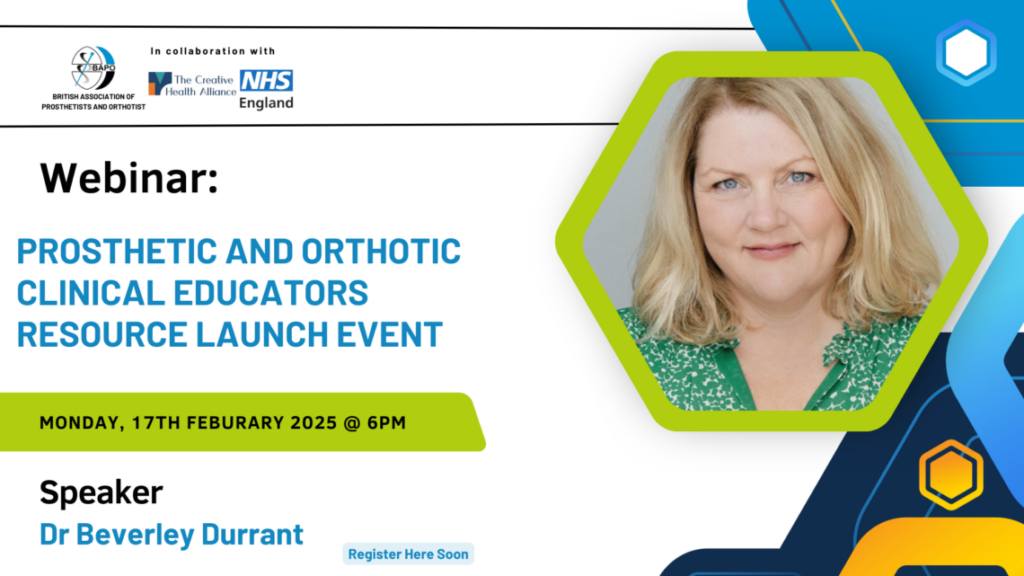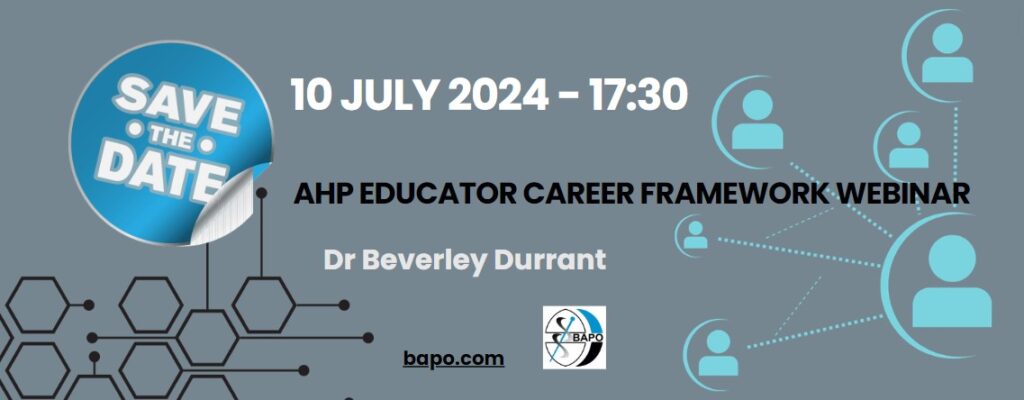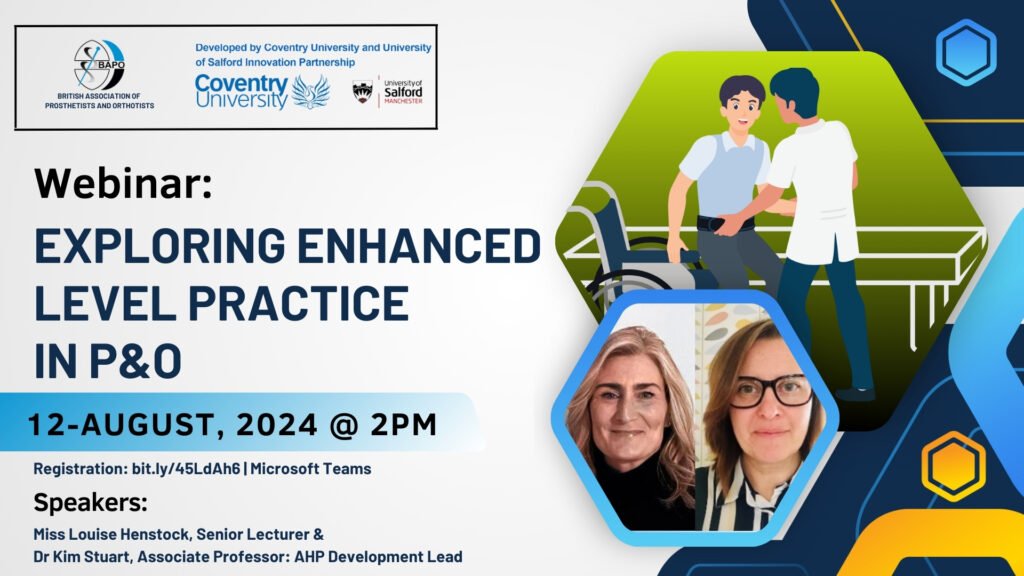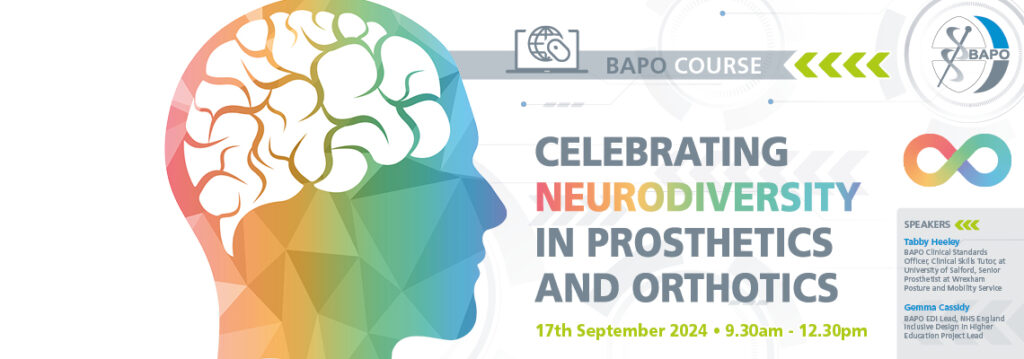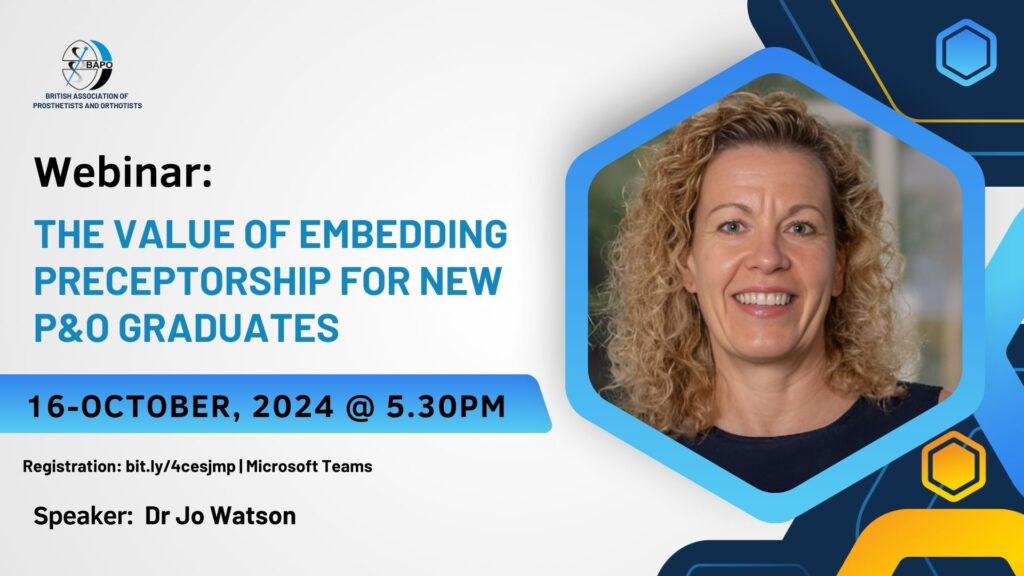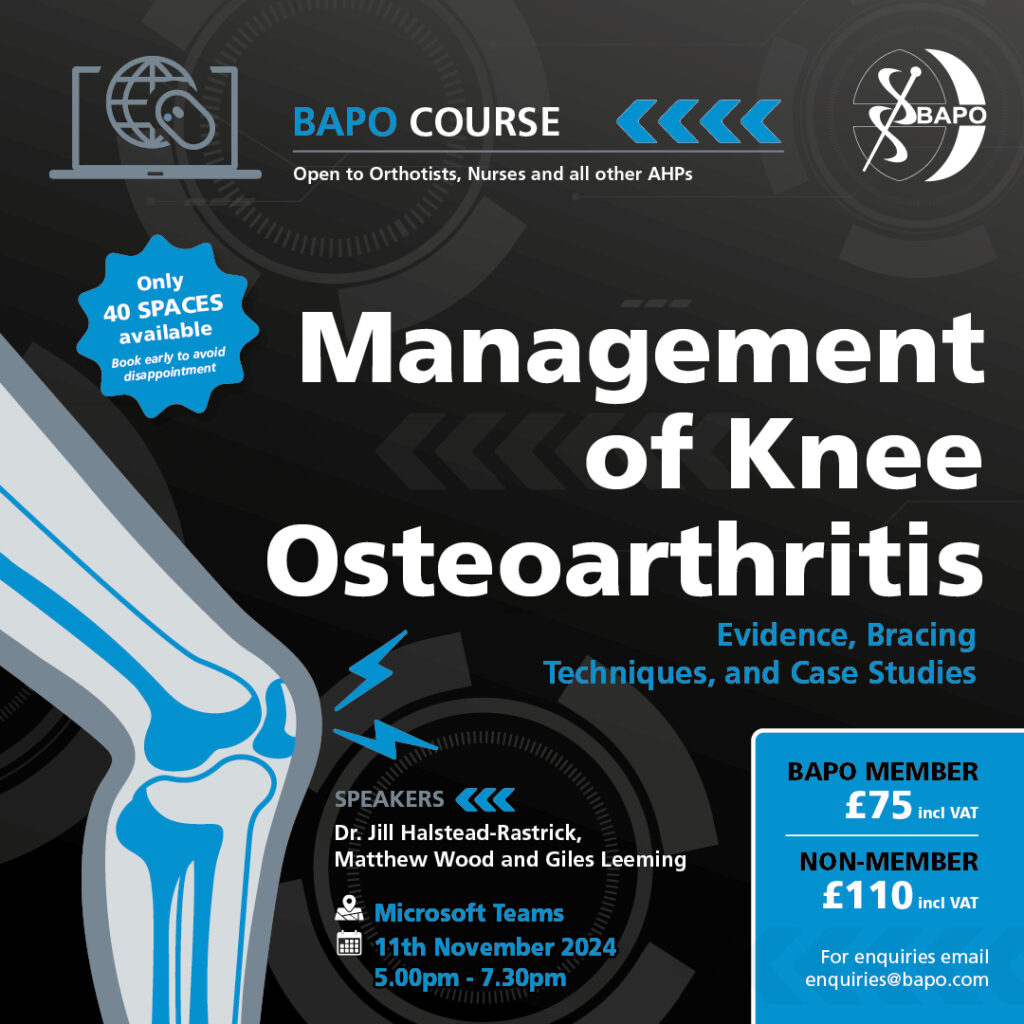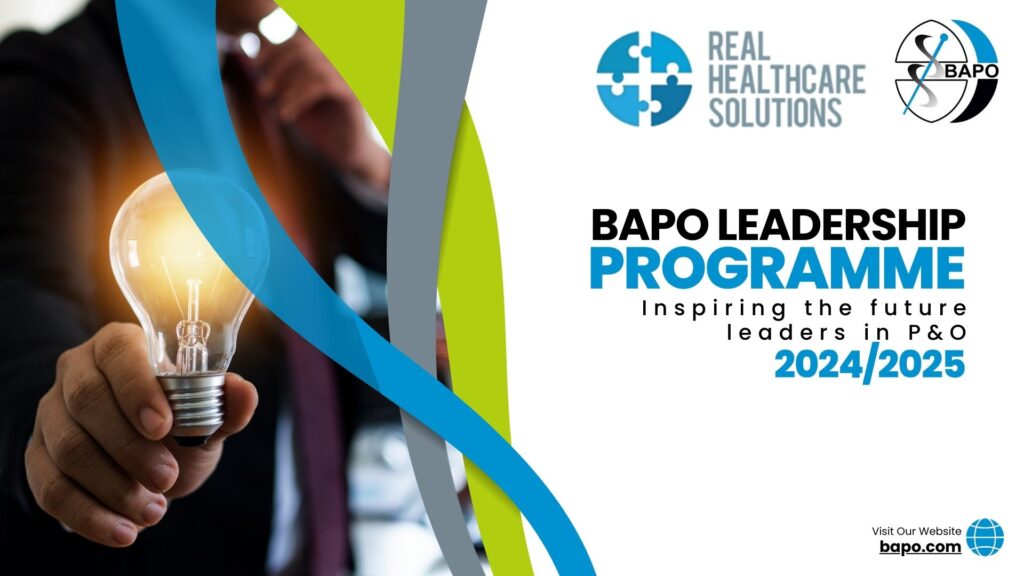Professional Development Opportunities: Short Courses & Webinars
At the British Association of Prosthetists and Orthotists (BAPO), our commitment to lifelong learning is central to our mission. As the recognised professional body for prosthetists and orthotists in the UK, we understand the critical role that accessible, high-quality education plays in maintaining clinical standards, advancing practice, and enabling career development.
Our educational programmes are designed to empower practitioners—whether newly qualified or highly experienced—with the knowledge, skills, and confidence to meet the dynamic needs of modern prosthetic and orthotic care. BAPO supports professionals throughout their career journeys, ensuring that learning opportunities are relevant, practical, and impactful.
Webinars
Our wide-ranging webinar series offers engaging content delivered by leading experts in the field. Topics include emerging technologies, clinical best practices, patient case studies, healthcare policy updates, and interdisciplinary approaches. These flexible online sessions provide members with the opportunity to stay abreast of current developments—all from the convenience of their home or workplace.
Structured Short Courses
In addition to webinars, BAPO delivers structured short courses aimed at deepening specialist knowledge and promoting professional excellence. These courses are grounded in real-world practice and aligned with evolving clinical demands, offering hands-on learning and peer collaboration. Participants benefit from interactive formats that encourage dialogue, critical thinking, and practical application.
Member-Led and Accessible
Our educational initiatives are shaped by the profession itself. We actively seek member feedback and encourage topic suggestions, ensuring that our content remains relevant and responsive to the evolving needs of prosthetists and orthotists. Furthermore, BAPO is proud to offer many of our webinars and learning resources at no cost or reduced rates to members, reinforcing our commitment to inclusivity and accessibility.
Through ongoing investment in education, BAPO is not only supporting the growth and development of individual practitioners but also contributing to the advancement of the profession as a whole.

Course description:
The aim of this course is to develop participants’ leadership capability by building self-awareness, practical leadership skills and the confidence to apply the Three Circles Model® (task, team and individual) in their own role and organisational context so they can become good leaders and leaders for good.
Grounded in John Adair’s values-based and skills-led approach to leadership, the course enables participants to translate leadership theory into practical action through reflection, application and structured sessions.
What is Action-Centred Leadership?
Action Centred Leadership (ACL®) is a practical and flexible approach to leadership that helps you understand how to lead people, deliver results, and build strong teams. It is based on the belief that today’s organisations need good leaders and leaders for good, people who are effective in their role and who act with integrity, responsibility, and purpose.
ACL focuses on leadership as a set of learnable skills rather than a personality trait or job title. It recognises that leadership happens at different levels in every organisation, whether you are leading a team, managing multiple teams, or helping shape strategic direction. The same core principles apply at each level, supporting leaders to balance performance, people and purpose while making a positive and lasting impact.
Learning Outcomes:
Gain insight into your own leadership strengths and development areas
Practise and apply the core skills of Action Centred Leadership with confidence
Evaluate and use the ACL Three Circles Model to balance task, team and individual needs within your role and across your organisation
Develop a realistic and measurable ACL Action Plan to implement ACL practices in your work environment
Intended Participants:
☒ Orthotist
☒ Prosthetist
☒ Orthotic technician
☒ Prosthetic technician
☒ Orthotic support worker
☒ Prosthetic support worker
We encourage practising Orthotists or Orthotic Support Workers, who must be working in the UK, to apply for reimbursement from OETT (The Orthotic Education and Training Trust).
Course fee funding for non-BAPO members would be at the 50 % BAPO member rate for practising Orthotists or Orthotic Support Workers who must be working in the UK only.
Applications can be made via the online applications link on the OETT website: www.oett.org.uk
Requests for reimbursement must include evidence of reflective learning/CPD.

Course description:
Orthotic management of early stroke – A one day course
Within our busy clinical schedules, orthotists are often requested to provide opinion on orthotic intervention for stroke patients at all stages of their recovery. A common comment is we wish we had seen them earlier. If our wish came true. What would we do and what is the ideal approach for orthotic treatment from day one?
For physiotherapists, there are a plethora of evidence based interventions with little guidance for best approach treating and managing stroke survivors with motor impairments
Our course offers a well thought out clinically reasoned approach based on physiotherapy interventions and NICE guidelines to create a care pathway that gives patients and therapists the best opportunity to reach optimal recovery and independence.
This course commences with formal presentations supporting the pathway and leads to practical demonstration with patients.
Learning Outcomes:
Orthotic management of early stroke
Background and understanding of stroke pathology
What’s the evidence for interventions?
Current practice and variability
A proposed model to optimise motor learning.
Practical assessment and clinical test
Simulating interventions
Complimentary interventions
Case studies
Intended Participants:
☒ Orthotists
☒ Orthotic support workers
☒ Other: Physiotherapists
Course timings: registration at 09:00, start 09:30, finish by 16.00.
We encourage practising Orthotists or Orthotic Support Workers, who must be working in the UK, to apply for reimbursement from OETT (The Orthotic Education and Training Trust).
Course fee funding for non-BAPO members would be at the BAPO member rate for practising Orthotists or Orthotic Support Workers, who must be working in the UK only.
Applications can be made via the online applications link on the OETT website: www.oett.org.uk
Requests for reimbursement must include evidence of reflective learning/CPD.

Course aim:
The course aims to improve the skills of the Orthotist when providing therapeutic footwear to their patients.
Course description:
Day 1 is presented virtually and covers footwear assessment procedures, what to consider, analysis of the situation and how to use this information to choose the most appropriate type of footwear. The different types of footwear will be discussed, stock, modular, and bespoke footwear (its uses, allowances, benefits and limitations). The mechanics of feet and how they affect footwear and how footwear affects feet is included, with lots of detail about designing bespoke footwear and how each part of it should be specified and designed by the orthotist to achieve the best outcome for the patient.
Days 2 and 3 are face to face and includes practical sessions aiming to improve assessment, measuring skills, casting, fitting, supplying and reviewing skills.
Potential problems at fitting and review and how to resolve them will be discussed and suggestions on how to improve practice will be suggested.
Attendees should be prepared to share a short case study on day 1. This can be either a success or a problem that they experience in their footwear provision. A brief description is all that is needed but photos would help.
Attendees should bring an example of a footwear draft to day 2.
Delegates will need to attend all 3 days of this Short Course.
Intended Participants:
☒ Orthotists
☒ Other: Learners
We encourage practising Orthotists who must be working in the UK, to apply for reimbursement from OETT (The Orthotic Education and Training Trust).
Course fee funding for non-BAPO members would be at the BAPO member rate for practising Orthotists or Orthotic Support Workers, who must be working in the UK only.
Applications can be made via the online applications link on the OETT website: www.oett.org.uk
Requests for reimbursement must include evidence of reflective learning/CPD.
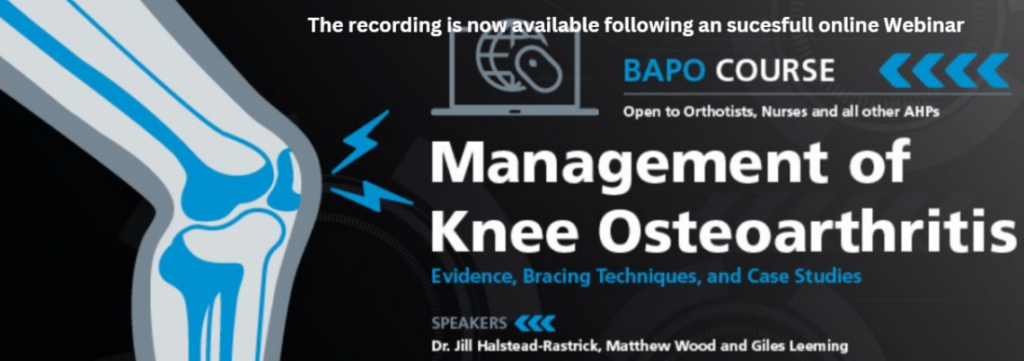
Conservative Management of Knee Osteoarthritis: Evidence, Bracing Techniques, and Case Studies
Current Evidence and NICE Thresholds
Speaker: Dr. Jill Halstead-Rastrick
Description: Exercise and weight loss are the first-line treatments for knee osteoarthritis (OA). Alongside this, knee braces offer people with knee pain an alternative treatment option, especially for those where first line treatments or knee surgery are not possible, but the evidence is limited.
Knee bracing was reviewed as part of the recent OA NICE guideline update and this will be discussed.
Auditing Knee Brace Provision
Speaker: Matthew Wood
Description: During the Covid-19 pandemic, when elective surgery was suspended on the NHS, the waiting list for total knee replacements got longer with fewer resources available to manage deteriorating patients. We designed an audit to propose appropriate patients are offered an orthotists’ assessment whilst they wait, and a protocol was agreed. This provided us with an opportunity to prove that the research supporting knee bracing could provide benefits to quality of life, improve outcomes, and reduce costs.
In this session, we wish to share the learning from this audit and provide a framework for those interested in addressing local barriers to provision.
Biomechanical Principles and Brace Selection for OA Bracing
Speaker: Giles Leeming
Description: Bracing for knee osteoarthritis relies on biomechanical principles to manage the osteoarthritis (OA) by redistributing the mechanical load across the knee joint. Understanding these principles is crucial for selecting and customising braces to cater to individual patient needs, ensuring effective pain management and functional improvement. Giles Leeming will go through these principles, and will also delve into the principles for accurate brace selection; and present case studies
Giles will also introduce Allan Henshall, a bi-lateral brace user and will also present problem-solving through various case studies.
Past Short Courses & Webinars
